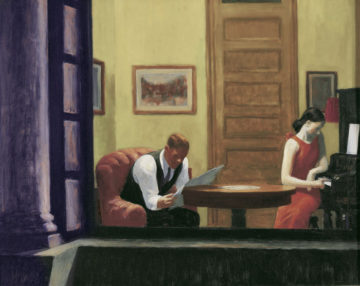by Charlie Huenemann

There is nothing new in this thought. But it’s worth revisiting now and again.
There’s an unbounded muddy terrain as dark and timeless as night. Drifting slowly over the landscape is a disk of light from an unknown source, like a spotlight. There’s no predictable pattern to its motion, and no place is illuminated for more than two and a half minutes. By then the light has moved on, never to return again.
When the light shines upon a circle of the land, its muddy features are revealed, tangled roots and rocks and mud. Look closer and you will see dull brown pods that stir into motion as soon as the light touches them. The pods break open and human beings climb out.
As soon as they stand up and stretch themselves into space, they begin their behaviors. Some experiment with a little dance or begin to run around or wave their arms. Some are confused for a moment, and then glance around to see what the others are doing and try to do the same. Some break from this and invent their own things to do. Some of the humans make fun of the others, or even attack them, accusing them crossly of doing something wrong. Some hump like dogs. One figure stands up, looks around, and lies back down again, and curls into a ball. Some pods never open.
Some stare into the light and after a moment’s thought begin to declare its origin. Some measure the speed of the advancing dark perimeter and make prophecies. Some shove the mud around, or pile up mud structures, either for themselves or for others. They bark at their neighbors and impose their wills upon them. Some of them command their followers to kill one another, and then there are body parts and blood in the mud.
Some human beings open their eyes and see the suffering of others, and reach out to hold them or just stand nearby. Some look around and begin to cry, or laugh, helplessly.
Some begin to jabber, as if the disk of light really is a spotlight and it is now their time to speechify. Others listen intently, silently moving their lips along with the speakers’. Some plant gardens, or look for shade. Some will watch what all the others are doing and invent performances to reflect their behavior back to them, and show how silly it all is. Amazingly, under such conditions, many manage to fall in love, some more than once.
One human being says, “It goes so heavily with my disposition that this goodly frame, the earth, seems to me a sterile promontory.” And another says, “I know I have the best of time and space, and was never measured and never will be measured.” A third says, “Astride of a grave and a difficult birth. Down in the hole, lingeringly, the gravedigger puts on the forceps.” One hears all this and looks to the dark horizon, trying to think clearly.
But the disk of light moves on, ceaselessly on, across the terrain, and one’s time in the light soon ends. Bodies fall in the dark. New pods stir to life, and new human beings see a little of what the others have been doing, but all is forgotten in time. Put another way, what happens always seems new, as none of us sees or lives beyond the light.
“There is no place that does not see you,” someone says. “You must change your life.”
